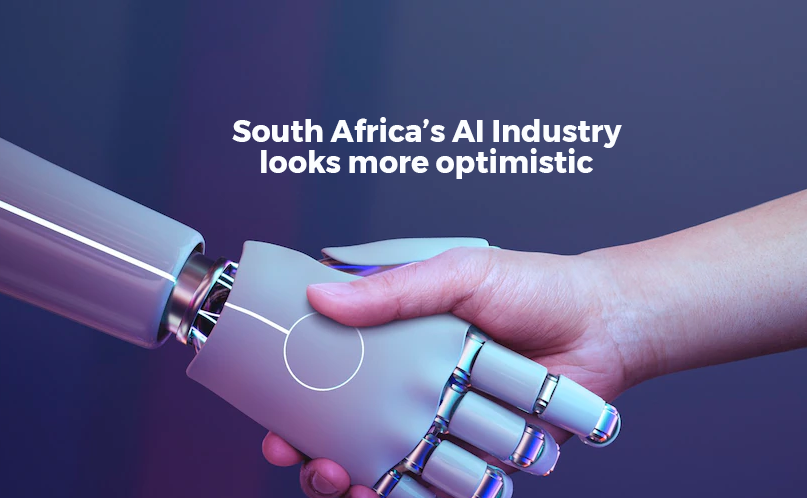South Africa’s AI Industry looks more optimistic

The concern that Africa’s AI industry was not ready for the 4th industrial revolution is been debunked by the widespread development of AI in Africa. Startups are all bringing the country’s AI industry to global prominence. A lot of resources and money are being invested in AI development in Africa, with Tunisian AI startup InstaDeep getting $100m funding early in 2022.” Additionally, a 20% CAGR is predicted for the global market, which will increase from $387 billion in 2022 to $1.3 trillion by 2029.
A growing number of vendor-based programs supporting the development of AI/Deep Tech solutions are attracting “want-to-be learners, entrepreneurs, and job seekers,” according to the report, which lists over 30 AI/Deep Tech communities in the Africa region. These communities offer a variety of services and draw these individuals. A “good hint that this technology and its attendant start-up ecosystems can win big across Africa if these trends persist,” according to the report’s conclusions.
AI is now closer than it was before. We see this in the growth of startups operating in the industry, the increased willingness of investors to invest, and the massive adoption of AI services by businesses and individuals.
AI adjusts itself to the user’s wishes and needs by using deep-learning algorithms, contextual analysis, and picture recognition technologies. In other words, AI assumes the role of the digital brand, HR department, and other firm departments.
Background of the AI Industry in South Africa
Numerous issues were raised during a roundtable discussion on AI in South Africa in July 2017 that was organized by Accenture and the GIBS Business School, including data quality, data privacy, workforce readiness and reskilling, and potential job losses. But in the end, everyone concurred that South Africa needed to develop its skills in order to participate in an AI-driven future.
There were several structural issues that prevent South Africa from properly integrating new technology into the economy. These flaws include subpar primary through university education systems, scientific research institutions, subpar national innovation ecosystems, and subpar enabling infrastructure to sustain growth.
But as technologies have recently converged, economies are entering a new era in which artificial intelligence (AI) has the ability to get around the physical constraints of labor and capital. Universities and research facilities provide a fertile environment for top scientists and engineers to start their careers and develop their ideas. They are the breeding grounds for AI ecosystems. In order to offer supported AI initiatives in the nation, South Africa is imitating nations like China, India, the US, the UK, and Koreans.
What the government has done thus far to increase access to AI may be impossible to criticize. Their policies are a crucial component of South Africa’s successful AI innovation.
Startups to Watch
While entrepreneurial dynamism in AI varies significantly from country to country, South Africa is surely running far ahead of other African countries. South African AI startups are beginning to show signs of progress and those listed to watch out for include:
DataProphet: Data Prophet is a producer of a variety of machine-learning solutions, mostly for the insurance and finance industries. Its AI solution suite has a track record of cutting faults and scrap by at least 50% while increasing factory productivity. The startup’s technology actively suggests the best control parameter choices to enhance output.
A team of over 40 engineers, mathematicians, data scientists, and computer scientists at DataProphet is dedicated to providing useful information and measurable results to achieve continual improvement. Over $16 million has been raised for the firm over two fundraising rounds.
Xineoh: Xineoh offers a platform that uses AI to forecast consumer behavior. The platform of the South African firm aids companies in making predictions about what consumers will buy, where to promote goods, and how to target a brand’s narrative.
The platform gives companies the chance they need to maximize productivity and customer happiness by helping them outsmart their rivals. Xineoh enables the company to eliminate wasteful inventory and maximize working capital by accurately predicting what products customers will purchase. Vian Chinner created Xineoh in 2015.
Clevva: The technological company focuses on the art and science of decision-making. It was established on the basis of a common vision to create a technological platform that would allow any business to efficiently collect and scale their sales.
Clevva Virtual Agents can function as Outbound Agents, vetting leads or putting forth focused offers. Additionally, they can act as inbound agents, resolving issues that your chatbot or FAQs can’t, saving time for live agents by handling them.
Aerobotics: Aerobotics develops AI systems for drones. Benji Meltzer and James Paterson, two South African businessmen, founded Aerobotics in 2014. The company was founded in Cape Town by Meltzer, who has a background in data science, and Paterson, who has a background in engineering. It also has offices in Los Angeles and other remote locations around the world.
The primary goal of Aerobotics is to create artificial intelligence systems for unmanned aerial vehicles (UAVs). In both the automated analysis of data collected during missions and the flight-autonomy systems, we offer smart, intelligent applications. The agriculture sector is Aerobotics’ primary area of concentration. The startup has raised $39M across 3 rounds.
